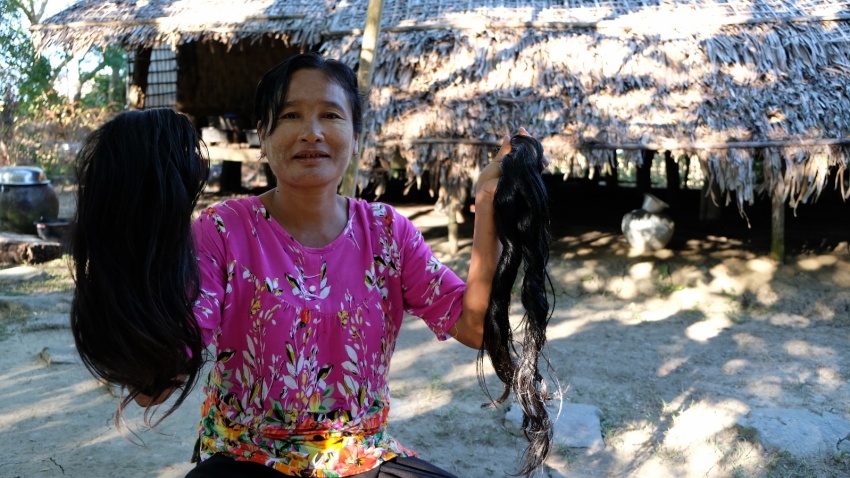
19/ Apr/ 2018
Khaing Yu Swe, 45, lives in the small village of Myint Nar with her family, a few kilometres up-river from the town of Sittwe, capital of Myanmar’s troubled Rakhine state.
Her family’s income relies on Khaing’s hair-trading enterprise, a business supported by a Red Cross livelihoods cash grant as part of programme helping communities affected by flooding, violence and population movement in Rakhine.
“In my family there is me, my brother and sister, and our father who is 79. My daughter lives in another town and is working, but doesn’t make enough to support us, so the money from the hair business needs to be enough to support all four of us living here.
“We invested the 200 US dollars (196 Swiss francs or 160 euros) grant from the Red Cross to buy hair from people in the village.
“One bundle of hair from one person costs 10 to 20 US dollars, so with the grant money we were able to buy hair from about 20 people. When we sold the hair to a dealer in the local town we made about 70 US dollars profit.
“From that money, we reinvested 200 dollars to buy more hair, and used the profit to pay for basic necessities for the family and health care for my father.
“Now, after our living costs are covered, we’re able to save 5 to 10 dollars a month.
“We sell hair to the dealer in town about twice a month and that enables us to make enough money to get by, but a lot depends on the health of my father. If he is well we can do more business, but if he is unwell then we need to look after him and can’t spend so much time on the business.
“It takes about 10 days for us to collect enough hair to sell to the dealer. We buy from people in our home village, and we go to villages in the surrounding area to buy hair from people there as well.
“I leave my village in the early morning and travel to the surrounding areas on foot or by boat. Mostly we buy from women but sometimes we find men whose hair is long enough to cut. The hair needs to be at least 30cm long, but longer is fine too.
“When I’m visiting the villages, I tell people that I am coming to buy hair. I announce it to the whole village and then people come to me if they want to sell.
“Some people are becoming Buddhist nuns and are shaving their heads because of that, so that is a good source of hair because we get the whole lot. Other people have very long hair and we can just take the bottom 30cm when they get it cut.
“Because the hair takes a long time to grow long enough we usually need to go to new people each time, but there are some people who call us when their hair is long enough and we go back to them about once a year.
“People who I know well, who I think have good hair and might want to make some money, I will ask them directly but I don’t chase anybody for their hair. I just let people come to me if they want to sell.
“Most of the people we buy from are 30 to 40 years old and they want to make some quick money, and often because they are cutting their hair anyway.
“In summer when the weather is very hot is the easiest time because people are keen to cut their hair to be a bit cooler and want to make some money at the same time.
“Before the hair trading business, I tried a few different jobs like weaving, but then I heard about hair trading and I gave it a go; that was 17 years ago and I’ve been doing it ever since. It’s a pretty good business for us.
“I sell the hair to a dealer in the nearby town, but after that I don’t know what happens to it. I think it goes to China but I don’t know what they use it for.
“The cash injection from the Red Cross means that we are now able to save money each month, we’ve paid off our debts and we have some money saved in case of unexpected emergency costs like health care, particularly for my father.
“The grant supporting the business has made our lives here so much more secure – it has worked very well, I’m really happy that my family and other people in the village were able to get this help from the Red Cross.
“Everyone in the village is poor so it’s very hard to choose who should receive the grant. Sometimes, because some people get grants and others don’t, there are some problems but overall the grants worked out very well and I’m very thankful for it.”